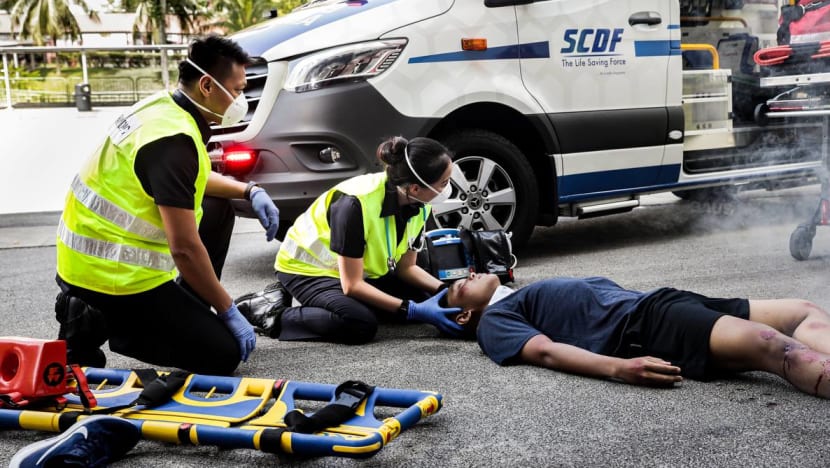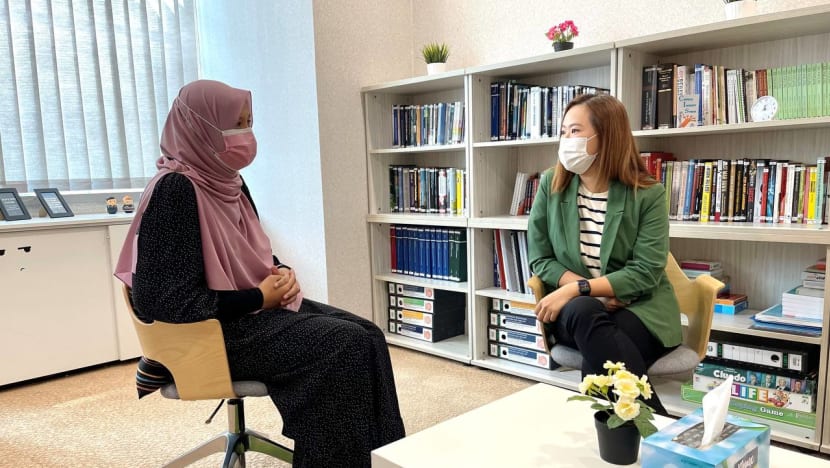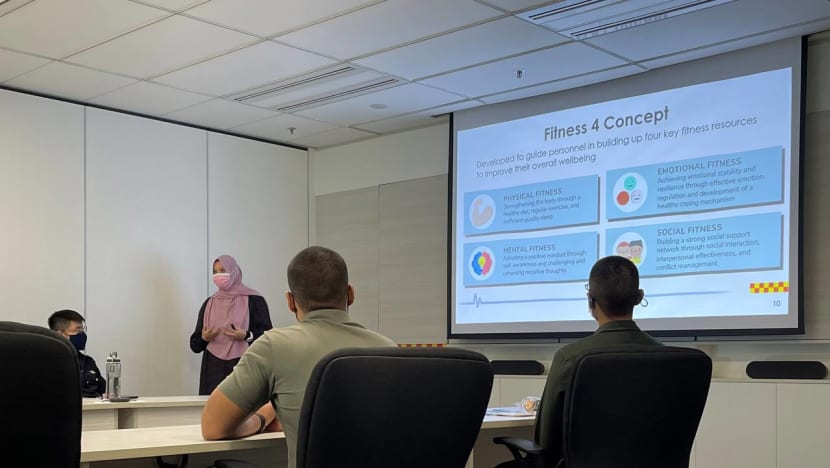When SCDF frontline officers experience trauma after an incident, this team cares for their mental well-being
From rescuing people from fires to attending to road accidents, SCDF frontline officers are often lauded as heroes, but their work may exact a psychological toll on them. CNA speaks to the SCDF department that looks after the mental health of those who risk their lives.

SCDF’s ambulance crew responding to a simulated road traffic accident. A road traffic accident is an example of a critical incident that might leave frontline officers with signs of trauma. (Photo: SCDF)
SINGAPORE: A deadly earthquake, a road traffic accident with mass casualties, and the murder of a toddler.
For Ms Khoo Swee Giang, these critical incidents capture the necessity of her job as the lead psychologist and head of the Singapore Civil Defence Force’s (SCDF) care and wellness office – her job begins when SCDF’s frontline officers complete theirs.
As part of the Emergency Behavioural Sciences and Care (EBSC) unit, which functions as SCDF’s pillar of psychological and emotional support, Ms Khoo helps frontline officers through mentally demanding operations and everyday situations.
In the 2008 Sichuan earthquake, psychologists provided support for SCDF’s Operation Lionheart contingent when they returned to Singapore, she recounted to CNA.
“I remember during the debrief sessions, they recounted how heartbreaking it was to retrieve the bodies of young children. That (is the) kind of impact when personnel are able to relate to the unfortunate (incident) with their personal experience,” she said.
The murder of a two-year-old child on Father’s Day three years ago left a lasting impression on Ms Khoo.
“When I was speaking to the crew, I saw how difficult it was for them, especially when they have kids or nieces or nephews of their own. So that’s the kind of psychological impact (a critical incident like this) can have on our people,” she explained.
Ms Khoo said many people have a “heroic” impression of SCDF officers.
“When there’s a fire, they’re the people who go into the fire while everybody’s running away,” she added.
“But I think it’s important to also remember that behind every bunker gear that they wear, or the blue uniform that they’re in, are average men and women. They have their own families like us, they also have strengths and weaknesses,” she explained.
“We do also have quite a big population of NSFs (full-time national servicemen), who probably have never worked before, but once they step into SCDF, they have to fight fires or attend to emergency cases.”
“With all the critical incidents that they turn up for, it's natural if there are times that they need a bit more support and a little bit more help,” she added.
“STRUCTURED” WAY OF APPROACHING EMOTIONS
Helping people recover from the trauma of experiencing critical incidents is not as simple as lending a listening ear.
After an incident, EBSC will contact the Commander Fire Station and reach out to para-counsellors on the ground, because they “might have insider news” about how the frontline officers are coping.
“We may get the para-counsellors to talk to the people first and help us make the arrangement. So when we come in, everything is settled. We can proceed with the debrief session,” she said.
EBSC psychologists also need to be trained in critical incident stress management, said Ms Khairiyah Kassim, lead psychologist and head of the operations and resilience psychology branch.
“As a psychologist, you have to be professional and ensure that you are capable and competent to do your work. You can’t be asking a man who is doing a lot of rescue work and start talking about their emotions out of the blue. That’s not how some of our personnel function, because emotions are a vulnerability,” she said.
“That’s why it needs to be structured enough for us to come to that point. There are ways of doing it, steps for us to do it, and we need to be trained to do it.”
It takes rapport building and being able to ask questions that are “very targeted yet enables the individual to feel okay”, added Ms Khairiyah.
“That psychological safety is like a net that we need to build in therapy. So people might think that it’s just talk therapy, but actually, it’s a skill altogether.”
Some of the bigger challenges EBSC psychologists have tackled include suicide crises, noted Ms Khoo.
“There will be situations where some of our personnel may be going through – some personal problems – that may distress them so much that they are thinking of killing or harming themselves. Those are really crises where we have to drop everything we (are) doing and just attend to the person,” she said.
“We work closely with the supervisors to ensure that there is care and support from the unit level. Then we also work with the medical officers … to ensure that we all have similar information about a particular recruit, for instance, and how we can better care for him in a more well-rounded (way).”
That said, there is a common misconception that EBSC only comes in when mental health issues crop up, but that is not the case, said Ms Khairiyah.
“We want to ensure that when we say ‘operationally ready’, it's not (just) in terms of mentally ready, but we also try to ensure that (psychological support) contributes to the work itself as frontliners (and) their emergency responses.”
Such support involves preparation and prevention work, which could mean administering assessments to ensure the officers who enlist “possess the right attitudes and qualities to take on such positions in the frontline”, added Ms Khoo.
In the event someone experiences “adjustment issues” after being exposed to critical incidents, the EBSC team conducts structured debriefings to “help the person integrate back into their daily functioning”, said Ms Khairiyah.
EBSC psychologists also provide consultation to teams based on evidence and literature to understand their needs before suggesting various intervention methods.

TRAINING SUPERVISORS TO SPOT SIGNS
With so many SCDF officers to look after, EBSC ensures supervisors are trained to spot signs of possible mental trauma after a critical incident.
“I think it helps a very big deal when we have para-counsellors on the ground. They are trained in crisis support as well.
“When they know that this (person) attended to a potentially critical incident, they will let us (or) our operations centre know ... If any incident is considered high stress, they may also send us a text,” said Ms Khoo.
“Then when we know it, we’ll reach out to the Commander Fire Station and ask, ‘Do you think there's a need for us to come in to provide support?’ Some will say okay; some will observe their staff first before making the decision.”
Ms Khoo added that signs to look out for include “abnormal behaviour”, such as someone who is usually jovial appearing withdrawn. Another sign is avoidance – for example, if the last duty call was a paediatric case and the person is avoidant when a similar call comes in subsequently.
Ms Khairiyah stressed that supervisors are made aware that symptoms look different in different individuals.
“We don’t want to pigeonhole and pathologise people if it’s not necessary. In such events, (we look for) what is out of the norm; we look at the functioning of the person. And so, it requires the supervisors to know their men and women,” she said.
“When people get affected, it’s best when they seek help as early as possible. It’s easier to work when you just have, say, a normal flu, but of course, it’s also not the case that they should not seek help anymore after it’s been a few months.”
RESILIENCE TRAINING
But supervisors and para-counsellors might not always be able to spot the signs of distress in their team. EBSC helps officers be aware of these signs in themselves first by putting them through resilience training.
During such training, they are taught to look out for cognitive, behavioural and physical signs.
“We (don’t just) talk about what we look out for in a team … but (also) understand why we look out for these things. It’s not just looking for signs and symptoms; we don’t want to be prescriptive,” said Ms Khairiyah.
“We want them to have an understanding also, that if this happens, then their team dynamics get affected. If team dynamics get affected, their productivity is not going to go well.
"And because we are also public facing, chances are it's not going to go great at all. So when our personnel understand why we are doing what we are doing, then there's more buy-in.”
To break the stigma around seeking help, Ms Khoo added that EBSC has packaged personal resilience as four domains of fitness: Physical, mental, emotional and social.
“We believe when a person is fit in these domains, they will be better able to bounce back if there are setbacks or any challenges that they face in the line of work or in their personal life.”
Taking care of oneself is important, and while morale management among the team is crucial, increasing self-awareness is the first step, said Ms Khairiyah.
Ms Khairiyah walks the talk by “knowing when to press the pause button” when she is particularly shaken by a case.
“It's not easy to hear trauma and part of the intervention requires us to hear the details. So, there is always an increased risk that you might develop secondary trauma. Being in this job for more than 10 years, you know what’s your trigger point, what are your own vulnerabilities,” she said.
“That’s the challenge because I can be seeing individuals or responding to crises, and I will get so tired after that. It’s important for me to know when to press the pause button, (and do) what I need to do before I go back to my other responsibilities, my other roles.”
HELPING AN NSF DEAL WITH THE AFTERMATH OF A CRITICAL INCIDENT
One of Ms Khairiyah’s patients has benefitted from her expertise.
It was only Darren’s (not his real name) second duty shift as an emergency medical technician when a patient collapsed in front of him after suffering a cardiac arrest. The woman, who was in her 50s, did not survive despite Darren’s best efforts to save her.
The woman originally called for help with her back pain. But when Darren and his team arrived at the scene, she had problems breathing.
“I was about to administer the oxygen for her, when she just collapsed on the spot. I didn’t know it was a cardiac arrest until my paramedic asked me to (take the CPR machine),” said Darren about the incident that happened around October last year.
He was tasked to give oxygen to the patient, but she died.
“After that call, I was already very demoralised because I felt like a burden to the team and to the patient. Maybe one more person doing things faster might actually save her life. I still watched her talk and then she just collapsed in front of us,” he said.
“To make things worse, immediately after we came back to the station, the next call was again (about) a cardiac arrest.”
This time, Darren went down to the scene with firefighters. It was “very messy”, with nine people inside a space about the size of an average office room.
“Everyone was running around. I didn’t know what to do … I got even more panicked. My primary asked me to take something, but I just ransacked the entire bag. I was too lost already, I couldn’t compose myself,” he told CNA.
“Luckily that patient survived, but after that call, I kept apologising to my paramedic. He said, ‘It’s okay, you’re still learning’, but that’s when I realised the learning curve is so steep, to take (everything) in within one month.”
The four-person team was cut to three after that first month, comprising the paramedic, who is the overall-in-charge, an ambulance driver and an emergency medical technician NSF, Darren said, adding that the ambulance driver was also an emergency medical technician.
Darren was expected to be his paramedic’s “helping hand”, and he was not sure he could do it.
“During that period, I was quite scared of getting (a) cardiac arrest (call), especially during the night shift when you’re resting. Everyone was resting very well, except for me. My mind was just constantly thinking, ‘Will the next call be a cardiac arrest?’” he said.
“This happened to the point where even on my rest days, I couldn’t sleep very well.”
Knowing these fears might continue to affect him until his operationally ready date about a year away, Darren sought help with EBSC.

Ms Khairiyah was able to help him with “cognitive restructuring”, which included correcting negative self-talk, like believing he was not good enough and that he would be a burden.
“(The point is) to find evidence to really challenge the person's perception and belief of themselves, and to integrate that experience into daily life is another thing that we do with them. But most of the work, even though it sounds so complex, is actually done by the client. It happens between sessions,” she said.
Ms Khairiyah explained that she staggered sessions so Darren had time to practise the skills he learnt while still ensuring that he was supported.
Even though Darren has “less anxiety” these days, he shared that he still fears getting a cardiac arrest call. He also sometimes experiences flashbacks.
But whenever he needs to calm down before going on another call, he recalls the breathing techniques that Ms Khairiyah taught him.
“If I know a case is quite bad, it’s going to be urgent, I’ll feel a sense of panic. That’s when I’ll start to apply these techniques which I’m still using up till today. I have a clearer mind; I’m more composed. On the way (to the scene), I’ll do the breathing techniques,” he said.
Listening to Darren apply the skills she taught him, Ms Khairiyah shared that the greatest satisfaction comes from knowing she’s “part of a team that’s helping others in their post-traumatic growth”.
“I get inspired by their positivity, their ability to bounce back. I grew up well in many aspects, so I feel like it’s a privilege for me to learn a lot from these individuals.”


















